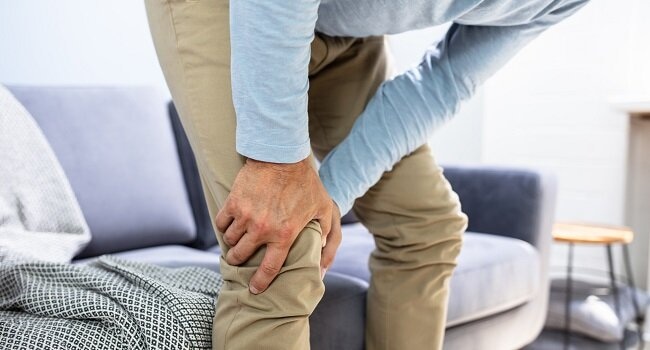Do you suffer from knee pain at night? Nighttime knee pain can interrupt your sleep and significantly lower your quality of life. The quiet of the night often makes the pain feel worse, as there are fewer distractions to divert your attention from the discomfort. This type of pain comes from various sources and can hinder the restorative sleep necessary for effective daily functioning.Â
Different types of knee pain stem from diverse causes, such as joint degeneration, inflammation due to overuse, or autoimmune conditions. Identifying the precise cause helps in customizing knee pain treatments and strategies to reduce pain, improve your sleep quality, and maintain your daily activities.Â
Here are several common causes of knee pain at night, each accompanied by targeted solutions to help reduce your discomfort and improve your nighttime rest. Â
Osteoarthritis Â
This condition happens when the protective cartilage of the bones degenerates or wears down over time, leading to pain and stiffness. These symptoms can intensify when the body rests at night, as the joint lacks movement that helps to keep it lubricated during the day.   Â
Regular use of anti-inflammatory medications helps reduce symptoms. Walking, swimming, or other gentle exercises can maintain joint function and alleviate stiffness.   Â
Rheumatoid Arthritis Â
This is an autoimmune disease that affects the joint lining, causing painful swelling. The symptoms become more noticeable during the night or after a period of inactivity.  Â
Prescribed medications can control inflammation and pain. Incorporating gentle physical activities and proper rest periods during the day can also manage symptoms effectively.   Â
Bursitis Â
The knee has small fluid-filled sacs called bursae that cushion the joint and reduce friction. Inflammation of these sacs, known as bursitis, can cause intense pain, particularly when lying down.  Â
Apply ice packs to the affected knee for 15 to 20 minutes before going to bed. This helps soothe the inflammation and reduce pain.  Â
Tendonitis Â
This inflammation of tendons affects the thick cords that attach muscles to bones. Activities that repetitively strain the knee, such as jogging or jumping, can lead to tendonitis, which may cause more pain at night when the body slows down and the tendons have a chance to swell.  Â
Avoid repetitive strain activities and apply cold packs to reduce swelling. Stretching and strengthening exercises taught by a physical therapist can also be beneficial.  Â
Injuries Â
Any injuries to the knee, such as sprains, strains, or meniscus tears, can cause pain that becomes more pronounced at night. This can be due to the body’s decreased ability to manage pain as it winds down. Â
Elevating the injured knee on a pillow can reduce swelling and pain. Using heat or cold therapy, depending on the nature of the injury, can also provide relief.  Â
Growth Spurts in Children Â
In children and teenagers, knee pain at night might be associated with phases of rapid growth, also known as growing pains. Although harmless, the pain can be very uncomfortable. Ensuring adequate rest and applying warm packs can ease symptoms. Gentle massage might also help alleviate discomfort.  Â
Plica Syndrome Â
This condition involves inflammation of the synovial membranes of the knee. It can fold and get caught in the joint, causing pain, especially when the leg is in a resting position for a long period. Â
Keeping the leg elevated and applying cold packs can reduce inflammation and pain. If conservative measures fail, surgical options may be considered. Â
General Strategies for Managing Knee Pain at Night Â
Here are some effective solutions to manage knee pain:Â Â
- Heat and Cold Therapy: Apply a warm pad or ice pack, depending on the condition, to manage stiffness and swelling.  Â
- Weight Management and Diet: Lighten the load on your knees by maintaining a healthy weight and incorporating anti-inflammatory foods into your diet.  Â
- Supportive Devices: Use knee braces or compression sleeves for additional support and pain reduction.  Â
- Adequate Rest and Activity Balance: Avoid overusing your knee during the day and ensure you rest adequately to prevent exacerbating pain at night.Â
These integrated strategies not only manage knee pain effectively but also improve overall joint health and night-time comfort. If your knee pain gets worse, see your healthcare provider as soon as possible. Â

Conclusion  Â
Knee pain can be a frustrating condition, but with the right diagnosis and management strategies, it is possible to reduce or even eliminate this discomfort. Always seek advice from a healthcare provider to choose the best course of action for your specific situation. Address the underlying causes and implement effective remedies to enjoy a more comfortable and restful night.Â


















